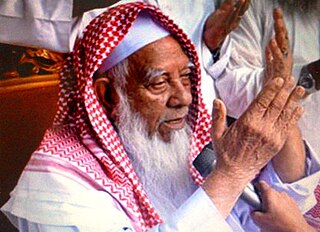
Eden Mohila College, is a women's college in Azimpur, Dhaka, Bangladesh. It was established in 1873 in the Farashganj area of Dhaka. In 1878 the school was named after Ashley Eden, Lieutenant Governor of Bengal. The college moved to its present premises in 1963. It is affiliated with the University of Dhaka as of 16 February 2017.

Barguna is a town in Barguna district in southern Bangladesh. It is the administrative headquarter and the largest town of Barguna district and a part of Barisal Division. Located on the bank of Khakdon river, the town covers an area of 15.57 square kilometres (6.01 sq mi) with a population of 32,235, as of the 2011 census.

Mymensingh Zilla School, also known as MZS, is a boys' public secondary school in Mymensingh, Bangladesh. The school was established as Hardinge School during the British Raj in 1846 and got its current name, Mymensingh Zilla School on 3 November 1853.

Bangladesh Chhatra League ; abbr.BSL/BCL), formerly known as the East Pakistan Student League, simply called the Chhatra League, is the student wing of the political party, Bangladesh Awami League, founded by Sheikh Mujibur Rahman on 4 January 1948. The organisation is banned and designated as a terrorist organisation by the Interim Government of Bangladesh.
| Old website = bogurapoly.gov.bdBogura Polytechnic Institute or BPI is a Government Technical Institute in Bogura, Bangladesh. It is one of the largest polytechnic institutes in Bangladesh.

Shah Ahmad Shafi was a Bangladeshi Sunni Islamic scholar, the chief of Hefazat-e-Islam Bangladesh, Rector of Al-Jamiatul Ahlia Darul Ulum Moinul Islam Hathazari and also the chairman of Bangladesh Qawmi Madrasah Education Board. He was born in 1930 in Rangunia, Chittagong and was educated at Hathazari Madrasah and Darul Uloom Deoband.
Sylhet Polytechnic Institute or SPI is a state-supported technical academic institute located in Sylhet, Bangladesh. It was established in 1955 by the then Government of East Pakistan. It was named as Sylhet Polytechnic Institute in 1959.

Hefazat-e-Islam Bangladesh is an Islamist advocacy group consisted mostly of religious teachers (Ulama) and students in Bangladesh. The group is mainly based on qawmi madrasas in Bangladesh. In 2013, they submitted a 13-point charter to the government of Bangladesh, which included the demand for the enactment of a blasphemy law. Under recent years, Hefazat has been formed into more of a moderate and anti-terrorist ideology due to success of Awami League in ensuring jobs and mobilising qawmi madrasa.

Faridpur Polytechnic Institute, often abbreviated as FPI, is a government technical institute in Faridpur, Bangladesh. It is one of the oldest polytechnic institutes in Bangladesh.

Tangail Polytechnic Institute or (TPI) is a polytechnic institute in Tangail, Bangladesh established in 1991.
Shyamoli Ideal Polytechnic Institute (SIPI) is a private polytechnic institute in Bangladesh for providing 4 years Diploma in Engineering under BTEB. The institute has been established in 1979. It has four campuses located at Dhaka, Chittagong, Rangpur, Lakshmipur.

Rajshahi Polytechnic Institute is a government engineering institute located in Rajshahi, Bangladesh. It was established in 1963. It offers 4 years Diploma-in-Engineering courses under the Bangladesh Technical Education Board.

The 2018 Bangladesh Quota Reform Movement was a students' movement demanding reforms in policies regarding recruitment in the Bangladesh government services. Bangladesh Sadharon Chhatra Odhikar Songrokkhon Parishad initiated movement initially began in Shahbag and on Dhaka University campus on 17 February 2018, and eventually spread country-wide by 8 April 2018. The movement rapidly attained popularity among students of different universities and colleges forcing the government to announce changes.

A series of public protests in Bangladesh advocating improved road safety were held from 29 July to 10 August 2018. They were sparked by the deaths of two high-school students in Dhaka struck by a bus operated by an unlicensed driver who was racing to collect passengers. The incident impelled students to demand safer roads and stricter traffic laws, and the demonstrations rapidly spread throughout Bangladesh.
The Bangladesh Road Transport Workers Federation or BRTWF was established in 1991, after Shajahan Khan successfully united truck, bus and automobile workers federations. It is currently the largest trade union in Bangladesh.
On the evening of 11 March 2023, clashes between students of Rajshahi University and local businesspersons occurred in Binodpur on the outskirts of the university campus in Rajshahi, Bangladesh. The clashes started over a mere issue of argument about bus fare between a university student and bus authority- where locals got engaged. The clashes injured hundreds of students, meanwhile, dozens of vendors were burnt along with the local police post. The clashes were later surpassed by law-enforcement agencies around midnight. Traffic was closed on the Rajshahi-Dhaka Highway and rail communication was interrupted due to students' blockade.

The 2024 Bangladesh quota reform movement was a series of anti-government and pro-democracy protests in Bangladesh, spearheaded primarily by university students. Initially focused on restructuring quota-based systems for government job recruitment, the movement expanded against what many perceive as an authoritarian government when they carried out the July massacre of protestors and civilians, most of whom were students. Started as a student movement, the movement later escalated into a fully-fledged mass uprising known as the Student–People's uprising.

The July massacre was the violent suppression and mass killings in Bangladesh during the July Revolution from July 16 to August 5, 2024. Triggered by the reinstatement of a controversial quota system and widespread public dissatisfaction, the crackdown was carried out by the government led by the Awami League party, its affiliated groups such as the Chhatra League, and various law enforcement agencies.

Student–People's uprising was a pro-democratic mass uprising against the Sheikh Hasina government in Bangladesh. The movement started as a quota reform movement soon after the High Court Division of the Supreme Court declared the circular issued by the government in 2018 invalid on 5 June 2024. But the government law-enforcing agencies and the ruling party members carried out massive suppression and mass killing of the protesters, known as the July massacre. The movement then turned into a fully-fledged mass uprising, ultimately ousting Sheikh Hasina on 5 August 2024.















